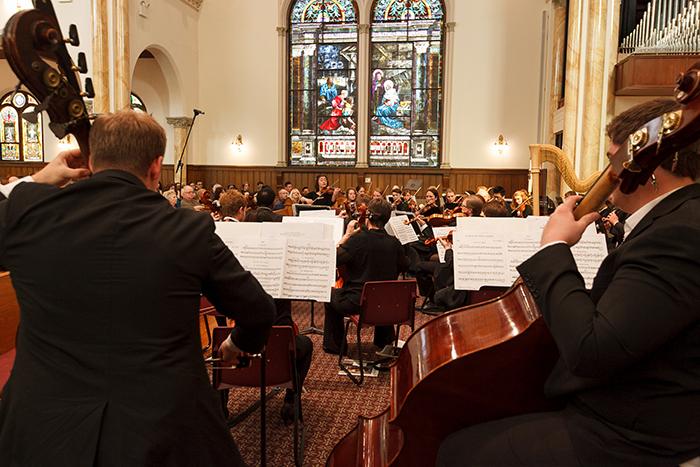History in the Making: Dickinson Presents Beethoven's Majestic Ninth

The Dickinson College Orchestra performs at First Evangelical Lutheran Church in Carlisle. Photo by Carl Socolow '77.
'Ode to Joy' performed in entirety for first time in college history
by MaryAlice Bitts-Jackson
When local and campus musicians tune up their horns and strings this Sunday, they’ll be readying for a concert unlike any other at Dickinson. For the first time, Dickinson musicians will present Beethoven’s challenging and powerful Symphony No. 9, “Ode to Joy,” in its entirety.
Beethoven debuted his final—and widely agreed to be his greatest—symphony several years after he had nearly entirely lost his hearing. Legend has it that after conducting the work onstage with assistance from a hearing conductor, the composer was prompted to turn around and face the audience, so he could register the powerfully emotional response to his new work. All these years later, audiences continue to be awed by “Ode to Joy,” the official anthem of the European community and one of the best-loved musical works of all time.
Your chance to experience it arrives on Sunday, April 30, as Dickinson musicians partner with local choral group Cantate Carlisle to present “Ode to Joy” at 4 p.m. at First Evangelical Lutheran Church, just a few blocks from campus at 21 S. Bedford St. The concert is free and open to the public. Lisa Turchi, visiting instructor in music, directs the College Choir and Professor of Music Robert Pound conducts the Dickinson Orchestra. Michelle Trefren leads Cantate Carlisle.
While the Dickinson College Choir has performed the choral final movement with the Hershey and Harrisburg Symphonies, college musicians have never before performed the full work, which includes more than 45 minutes of technically challenging orchestral music preceding the well-known choral finale.
Seventy student voices will join in the finale, along with nine faculty instrumentalists and singers, two staff members, more than five alumni, one emeritus faculty member and a musician from the U.S. Army War College, along with the local singers in Cantante Carlisle.
Two additional choral works are also on the program: Samuel Barber’s Agnus Dei, and Jonathan Dove's "Seek Him that Maketh the Seven Stars," featuring faculty organist Hannah Koby. And, as with all spring orchestra concerts, this program will feature a performance by the winner of the most recent student concerto competition. This year’s honored soloist, cellist Amelia Harper ’25, will perform Schelomo: Rhapsodie Hébraïque for Violoncello and Orchestra by Ernest Bloch.
Audiences should prepare for a stirring afternoon, says Pound. “Beethoven’s Ninth is a mammoth undertaking and, arguably, the cornerstone of the symphonic repertoire,” he says. “It is an epic emotional journey from fury and despair to joy, which parallels Beethoven’s struggle with deafness.”
TAKE THE NEXT STEPS
Published April 27, 2023